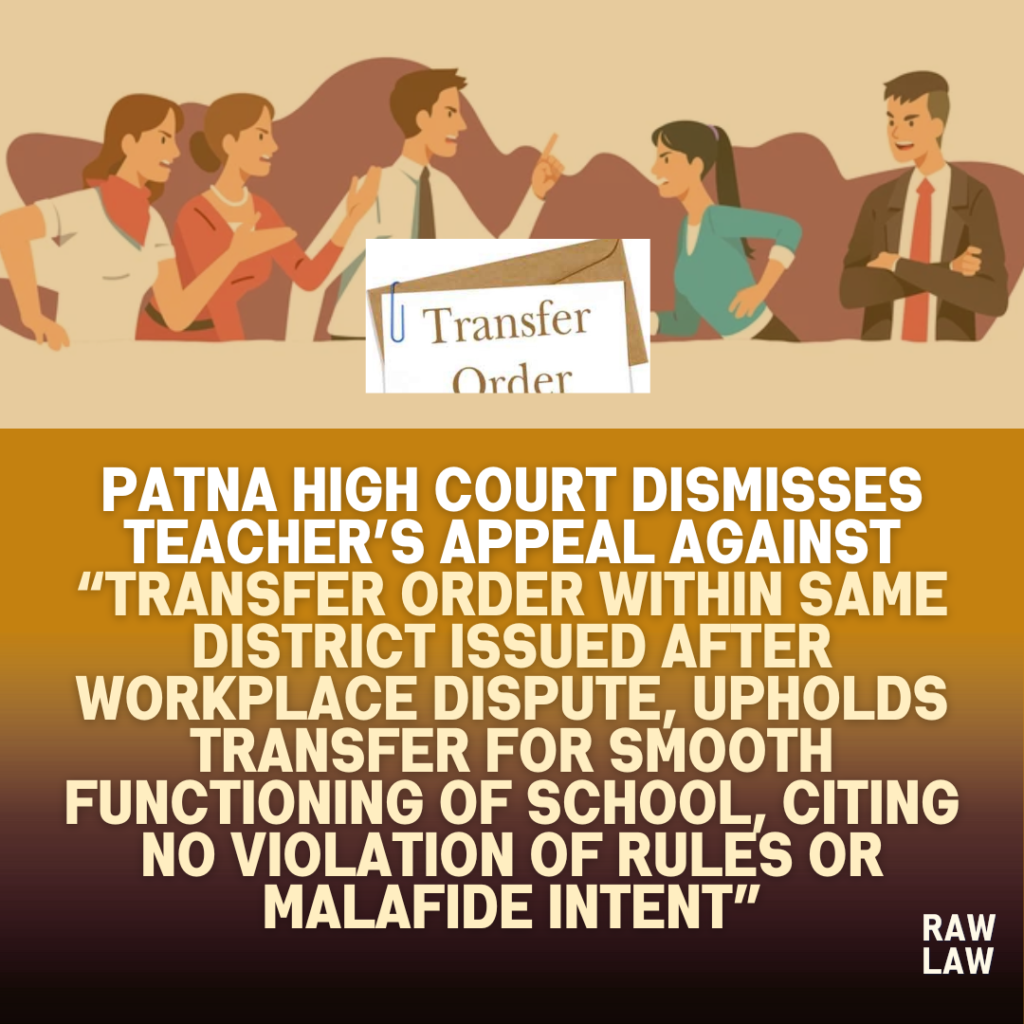Court’s Decision
The Patna High Court dismissed the letters patent appeal challenging the single judge’s order that upheld the transfer of the appellant, a government school teacher, within Begusarai district. The Court found no merit in the appeal, holding that the transfer order was within the district, aligned with the appellant’s chosen district, and issued in the interest of maintaining discipline and the smooth functioning of the school after a dispute between the appellant and another teacher.
Facts
The appellant, a government secondary school teacher in Begusarai district, challenged her transfer to another school located 40 km away within the same district. The transfer arose after the appellant was involved in a dispute with another teacher, Amit Kumar, leading to disruptions in the school’s functioning. To maintain discipline and the smooth functioning of the school, the administration decided to transfer both teachers to different schools within the district. The single judge, in the order dated 4 January 2023, upheld the transfer, noting that the transfer was within the same district chosen by the appellant and did not violate any rules. The appellant did not join the transferred post, leading to the initiation of departmental proceedings against her.
Issues
- Whether the transfer order issued against the appellant within the same district was arbitrary or in violation of the applicable service rules.
- Whether the transfer order warranted interference by the High Court in the exercise of its writ jurisdiction.
Petitioner’s Arguments
The appellant argued that the transfer was punitive in nature, issued solely on account of a workplace dispute with a colleague, and was intended to harass her. She submitted that the transfer to a school 40 km away, despite being within the same district, caused hardship and disruption to her personal life and was disproportionate to the alleged incident.
Respondent’s Arguments
The State and Zila Parishad submitted that the transfer was issued under Rule 16 of the Bihar Municipal Body Secondary and Senior Secondary School Service (Appointment, Promotion, Transfer, Disciplinary Proceedings and Service Conditions) Rules, 2020, in the interest of maintaining discipline in the school. The transfer was within the Begusarai district, which was the appellant’s chosen district, and both the appellant and the other teacher involved in the dispute were transferred to ensure the smooth running of the school.
Analysis of the Law
The Court examined Rule 16 of the Bihar Municipal Body Secondary and Senior Secondary School Service Rules, 2020, which governs transfers of teachers. The Court reaffirmed the principle that transfer is an administrative prerogative and can be exercised in the interest of administration and discipline, provided it does not violate statutory provisions or is issued with malafide intent.
Precedent Analysis
While the judgment did not cite specific case law, it applied the settled principles that:
- Transfer is an incidence of service and does not typically warrant judicial interference unless shown to be arbitrary, malafide, or in violation of statutory provisions.
- Administrative authorities are best positioned to determine transfers for the effective functioning of schools and to maintain discipline.
These principles guided the Court’s conclusion in rejecting the appellant’s challenge.
Court’s Reasoning
The Court observed that:
- The transfer order was issued within the appellant’s chosen district and aligned with the applicable rules.
- The reason for the transfer was a workplace dispute that disrupted the school’s functioning, justifying the administrative action taken.
- There was no material to indicate malafide intent or arbitrariness on the part of the authorities in issuing the transfer order.
- The appellant’s failure to join the transferred post despite the passage of considerable time resulted in departmental proceedings, which were a consequence of her non-compliance with lawful orders.
Conclusion
The Patna High Court dismissed the letters patent appeal, upholding the single judge’s order affirming the transfer of the appellant within Begusarai district. The Court found no grounds to interfere with the transfer order and concluded that it was issued to maintain discipline in the school and was within the administrative authority’s prerogative under the applicable service rules.
Implications
- Reinforces that transfer is an administrative function and will not ordinarily be interfered with by the courts unless shown to be malafide or arbitrary.
- Emphasises the importance of maintaining discipline and the smooth functioning of schools as grounds for transfer.
- Clarifies that hardship alone does not constitute a valid ground to challenge a lawful transfer within the same district.
Brief on Cases Referred
The judgment did not refer to specific precedents but applied settled principles under service law and administrative law:
- Transfer is a condition of service and not punitive unless established otherwise.
- Judicial review of transfer orders is limited to examining illegality, malafides, and statutory violations.
These principles underpinned the dismissal of the appeal.
FAQs
1. Can a transfer within the same district be challenged on grounds of hardship?
No, unless the transfer is shown to be arbitrary, malafide, or in violation of statutory provisions, hardship alone is insufficient to challenge a lawful transfer.
2. Is a transfer due to workplace disputes legally valid?
Yes, administrative authorities can transfer employees to maintain discipline and the smooth functioning of institutions when workplace disputes arise.
3. What is the scope of judicial review in transfer matters?
Courts will interfere with transfer orders only if they are arbitrary, malafide, or violate statutory provisions, not merely because of personal inconvenience to the employee.



